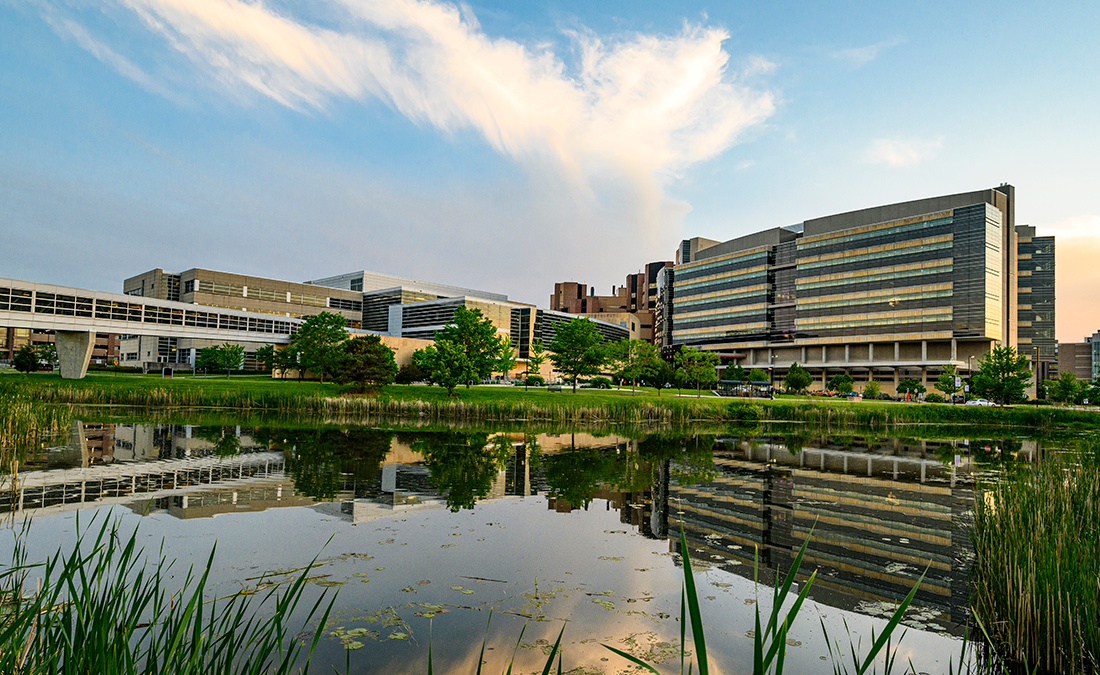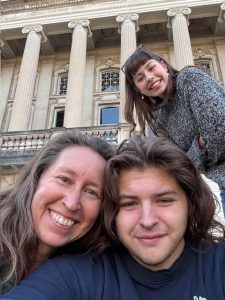
10 Dec Team Spotlight: Meredith Rhodes
Meredith works in clinical trials transparency reporting to UW Investigator Initiated trials ClinicalTrials.gov
PLEASE SHARE A BIT ABOUT YOUR PROFESSIONAL JOURNEY. HOW DID YOU ARRIVE AT YOUR CURRENT POSITION?

My professional journey is also a personal one. It took me from studying the Earth to clinical trials transparency.
As a GeoBadger (MS ’98, PhD ’02), I studied deposits of ancient lakes to learn about processes that shape the landscape and how landscape evolution influenced the sediments preserved in the lake basin. My graduate experience positioned me for work as an exploration geoscientist in the deepwater Gulf of Mexico out of Houston, TX. While this was creative and rewarding work, my family happily returned to Madison for our quality of life.
I worked as a geologic consultant for several years before health issues and my experience with the medical system changed my life and sparked a personal journey to study how our modern environment shapes our health. I am curious about the forces that informed the shape and function of human life in the past in comparison to what informs our shape and function today. I suspect the change in how we relate to our environment correlates to disease – as I was able to resolve my own health issues by closing this gap (N=1).
I had the opportunity to work within the academic medical system in 2016 when I joined the UW Carbone Cancer Center to support their Cancer Center Support Grant and to subsequently manage clinical trials reporting. When the UW recognized the need to support its Investigators with a central ClinicalTrials.gov service, I was hired to build it.
WHAT MOTIVATIONS FUELED YOUR CAREER PATH?
My pursuits are informed by curiosity, a drive to understand or improve complex processes, improving our collective health, and service to my communities.
In my current role, I’m driven by scientific integrity and an ethical obligation to people who volunteer their time and personal data so that we may learn life-changing things. We can build trust with the communities we want to help by showing our work and by giving them more than they expect to receive.
WHAT ARE SOME PROFESSIONAL DEVELOPMENT TOOLS OR RESOURCES THAT YOU WOULD RECOMMEND TO OTHERS IN YOUR POSITION/FIELD?
Anyone interested in clinical trials transparency work and more specifically reporting to ClinicalTrials.gov should consider the following resources and opportunities for professional development:
- Participating in the Clinical Trials Registration and Reporting Taskforce
- Studying Plain Language skills
- Registering for the Train the Trainer Workshop at NIH
- Familiarizing yourself with Best Practices in Clinical Trial Transparency and Disclosure
- Striking up relationships with study teams and colleagues who can help you learn and leverage:
- OnCore or relevant Clinical Trials Management System
- Relevant IRB application
- NIH Policy, eRA Commons, and the ASSIST system
- FDAAA Law for Applicable Clinical Trial reporting
- Institutional compliance procedures for support
- Gleaning insight into the ClinicalTrials.gov Protocol Registration and Results (PRS) system by understanding:
- Data aggregators, like from Aggregate Analysis of ClinicalTrials.gov (AACT)
- Integration tools, such as Smartsheet
- Basic data query languages and functions
- Basic concepts of APIs
- Basics of scientific protocol development and clinical trial conduct
- Familiarizing yourself with statistical language
HOW IS SUCCESS DEFINED IN YOUR FIELD?
Success is probably best defined by recognition from a thankful study team. Our service is designed to take some regulatory burden from study teams so that they can focus on their trials.
Internally, we track several ClinicalTrials.gov metrics related to best practices in clinical trials reporting aiming to get trials registered prior to first enrollment, summary results posted within a year of primary completion, proactively maintenance of UW records in accordance with FDAAA Law.
WHAT DO YOU LIKE MOST ABOUT YOUR ROLE?
It has been rewarding to create a UW ClinicalTrials.gov service and to continue to evolve our process. Problem solving is one of my favorite things. I also find it exciting to read about the science we’re conducting at UW.
WHAT ARE SOME CHALLENGES YOU FACE IN YOUR ROLE?
Some of the biggest challenges we face stem from slightly different definitions of ‘clinical trial’, specifically, between NIH and our interpretation of FDAAA Law. Getting into the weeds about policy and legal requirements for whether summary results are due to the public is interesting and can be mitigated by a study team choosing to register and report summary results data as a best practice, in ethical obligation to the participants and research community.
HAVE ANY MENTORS IMPACTED YOUR PROFESSIONAL DEVELOPMENT? HOW DID YOU DEVELOP THESE RELATIONSHIPS?
Several colleagues at UW are very important to me and consistently support my goals. Those relationships are developed in the course of day-to-day operations. I’ve connected with colleagues nationally in the ClinicalTrials.gov Registration and Reporting Taskforce and as a group, we support each other in our development as experts in this field.
I will also pay homage to my dad here, as a mentor. Dad was an outside-of-the-box thinker. He still inspires me to question why we do things the way we do.
WHAT DO YOU WISH YOU HAD KNOWN WHEN YOU STARTED YOUR CAREER PATH?
A job is so much more fulfilling if you find ways to align your personal values and interests with your professional mission. Or perhaps the other way around. You can be inspired by a professional mission authentically if you bring your whole self to it.
WHAT ADVICE DO YOU HAVE FOR SOMEONE PURSUING A SIMILAR CAREER PATH TODAY?
I would echo my last answer here.
WHAT’S YOUR FAVORITE PART ABOUT WORKING WITHIN THE UW CLINICAL RESEARCH COMMUNITY?
I work with great, like-minded people in the UW clinical research community. I have found it easy to collaborate with colleagues (a.k.a. my brain trust) to move my work forward in meaningful ways.



